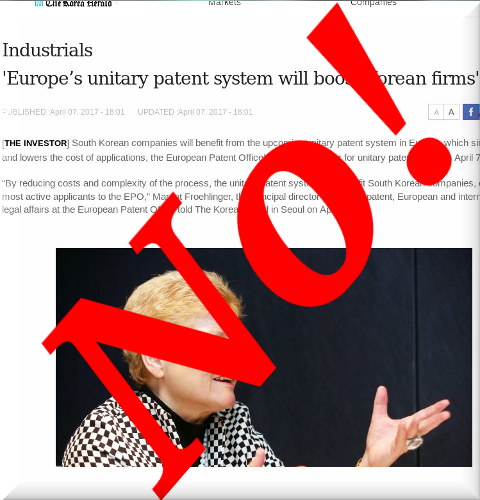

THE EPO is in chaos in part because of so-called 'reforms' like the Unitary Patent Court (UPC), which understandably face considerable resistance.
"Remember that they said 2015, then 2016, then 2017. They just can't seem to make up their mind. It's always "next year", whatever that year may be.""The EU Unitary Patent," says this law firm this week about the UPC, "is expected [...] from very early 2018," but that is not true. It's not expected, just hoped or craved by trolls and patent lawyers (especially prosecutors). And it's not coming any time soon, for various reasons not limited to Brexit.
Tackling the relevant part from this new article (titled "The EPO Grant Phase - Briefing Note"): "It is expected that, from very early 2018, it will be possible to validate a European Patent as a Unitary Patent as well as or instead of as individual national patents. Validation as a Unitary Patent will give the European Patent legal effect in a number of participating EU states."
"They just try to attract business, even from trolls."Remember that they said 2015, then 2016, then 2017. They just can't seem to make up their mind. It's always "next year", whatever that year may be. They're the boy who cried "Wolf!"
The article goes on as follows: "The procedure for validating as a single Unitary Patent will be administered centrally and will be substantially streamlined compared to validating the European patent in each of the individual participating states. A single renewal fee, approximately equivalent to that of four individual states, will be payable to maintain the Unitary Patent in force. The cost of obtaining and maintaining a Unitary Patent will thus be less than validating in multiple individual states and those applicants who routinely validate in more than four EU states may find obtaining a Unitary Patent a cost effective way of maintaining protection in Europe. More information on the Unitary Patent can be found here."
"The reality of the matter is -- and we cannot emphasise this strongly enough -- Brexit is not compatible with the UPC and no matter which party wins next month's election, these problems will certainly remain."Marketing. They just try to attract business, even from trolls. Watch the latest marketing from Kluwer Patent Blog, part of Team UPC. (via)
The reality of the matter is -- and we cannot emphasise this strongly enough -- Brexit is not compatible with the UPC and no matter which party wins next month's election, these problems will certainly remain. Article 50 being invoked is a death knell to the UPC, probably not just in the UK. A new article about UPC and the UK, covering "how the complex relationship affects businesses," speaks a lot about "patent trolls" -- the reason why UK-based software companies oppose Unitary Patent ratification. Here are some relevant portions/passages from the article:
In the world of technology, intellectual property (IP) is the secret sauce that will determine how valuable the business is - now and in the future. Not only will it help to differentiate between tech companies, but it is vital for attracting future investment and supporting international expansion.
Yet, not everyone uses intellectual property in the same way. Some parties, patent trolls, base their business model on aggressive IP lawsuits and quick settlement payments.
Patent trolls fall under the so-called Non Practicing Entities (NPEs), organisations that hold a patent for a product or process without any intention of developing it. However, not all NPEs are patent trolls: universities, research organisations or individual investors who lack the resources to develop something they hold the patent for also fall within this category.
There are so many factors in a patent system that might influence or encourage activity by an aggressive NPE, including litigation costs, the cost risk involved, uncertainty around outcomes and the speed with which cases are decided on.
Currently the US system is more attractive than Europe for NPEs: with the losing side typically not paying the winner’s legal costs, NPEs feel encouraged to ‘have a go’. The US additionally is a large geographical area, so a single decision can be effective across the entire country.
In Europe it is still necessary to enforce patents country-by-country, but the arrival of the Unified Patents Court (UPC) could change all that.